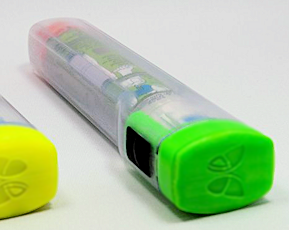EpiPen Smart Case Debuts
Aterica Digital Health, based in Waterloo, Canada, has designed an EpiPen case that's difficult to lose or leave behind.The "Veta smart case" uses sensors, Bluetooth radios and other technology to broadcast its location and perform several other tricks that could help users survive anaphylaxis. The case itself works with an app that runs on either Apple iOS or Google Android. Whenever a user's smartphone and case get too far apart to communicate, an alert appears on the phone. If a user misplaces a case, the app can reveal its exact location by tracking the signal it emits.

A small company thinks it has solved a big problem: people with severe allergies often forget to carry their epinephrine auto-injectors.
Aterica Digital Health, based in Waterloo, Canada, has designed an EpiPen case that’s difficult to lose or leave behind, the company said in a press release.
The “Veta smart case” uses sensors, Bluetooth radios and other technology to broadcast its location and perform several other tricks that could help users survive anaphylaxis.
The case itself works with an app that runs on either Apple iOS or Google Android. Whenever a user’s smartphone and case get too far apart to communicate, an alert appears on the phone. If a user misplaces a case, the app can reveal its exact location by tracking the signal it emits.
Such features address a serious problem. Studies consistently find that less than half of all people who are prescribed auto-injectors actually have them at all times. Some research puts the number below 30%. People with smartphones, on the other hand, tend to carry them everywhere, so alerts should prevent users from accidentally leaving their auto-injectors behind, and they may even stop younger users from choosing to do so. The Veta case can send parents or caregivers an alert when kids fail to carry it.
The case also helps ensure that EpiPens work properly when users need them. The device monitors when users replace their auto-injectors and notifies them when medication is near its expiration date. It also uses a built-in thermometer to warn them if conditions become too hot or too cold for epinephrine storage.When allergens do trigger attacks and users access their auto-injectors, the case automatically alerts a pre-selected group of family and friends who can then use GPS information to send an ambulance to the scene.
After users have opened the top of the case and triggered this alarm, the Veta waits several minutes and then asks users to confirm that they’re still conscious and functional. If users fail to do so, the device will audibly alert passers-by about the medical emergency.Users who travel abroad can tell the Veta to issue such alerts in the local language.
“As an anaphylaxis support system, Veta will have a significant positive impact on those at risk of anaphylaxis and their caregivers,” said Susan Waserman, MD, a professor of medicine at McMaster University in Ontario in a statement posted on the company’s site.
“It complements the allergic individual’s emergency care plan, facilitates appropriate early treatment, and may lessen anxiety for everyone affected.”
Aterica, which unveiled the Veta case at this year’s Consumer Electronics Show, is already taking orders for the device and expects to begin shipping it this fall.
The company is currently marketing the Veta to parents whose children have been diagnosed with severe allergies. The selling points are that parents may get near-certain knowledge that kids have their auto-injectors and that kids could get freedom from constant parental questions and reminders.